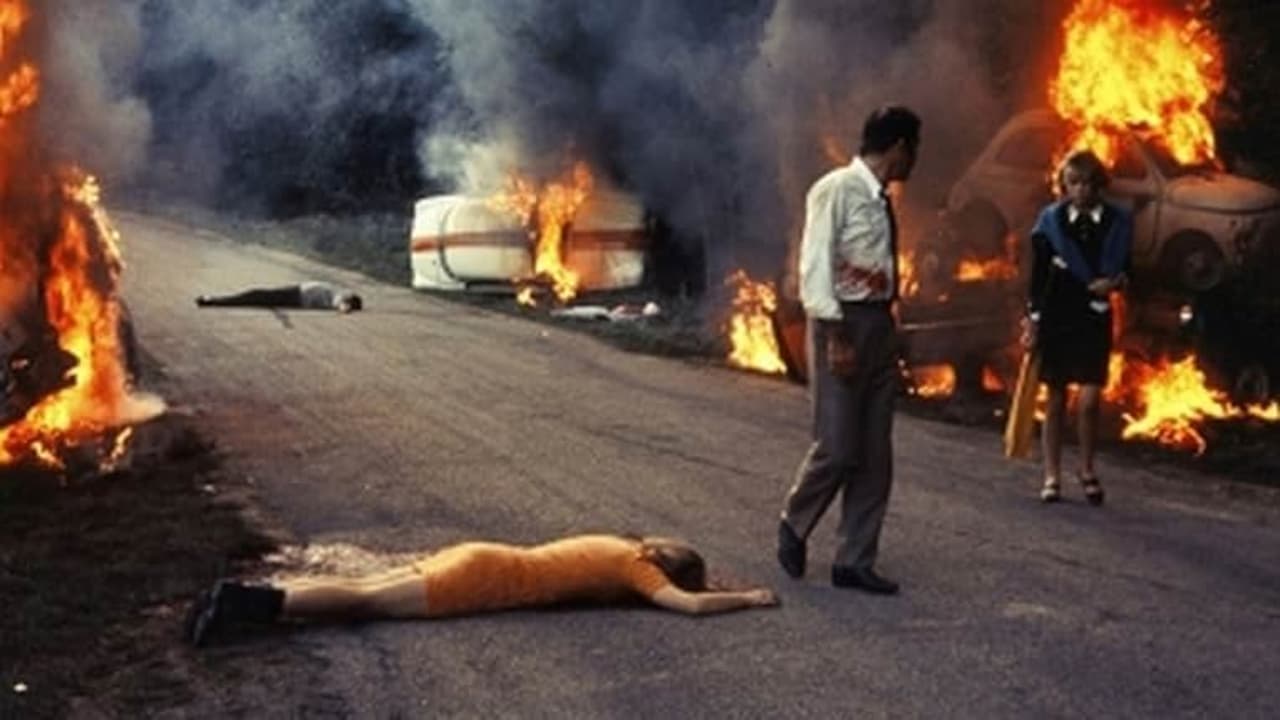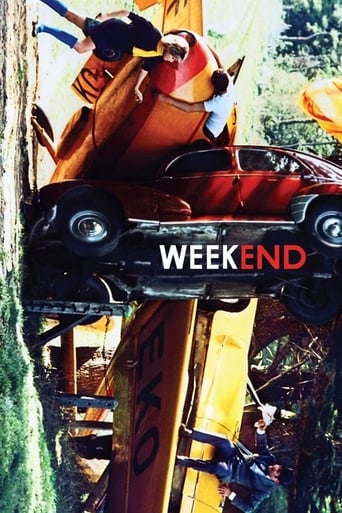



One of my all time favorites.
It's fun, it's light, [but] it has a hard time when its tries to get heavy.
View MoreI wanted to like it more than I actually did... But much of the humor totally escaped me and I walked out only mildly impressed.
View MoreAll that we are seeing on the screen is happening with real people, real action sequences in the background, forcing the eye to watch as if we were there.
View MoreWeek End is everything and nothing all in one film. It is a brutal work of agit-prop which treats its subjects with disdain- be they the apathetic and vile Parisian upper middle class or Godard's own Maoist youths. It is a perfect exercise in post-modern filmmaking- a film aware of its own power and uselessness. It is a film in love with and filled with an ethical hatred of cinema. A film where the fourth wall is meaningless and the viewer is the enemy. It is also one of the greatest works of cinema art.When viewing Week End, one must look at it as a film on to itself and also in the context of Godard's hyper-creative 1960s run.As a film on to itself, it bends the definitions of cinema as it follows the vile actions of an upper-middle class Parisian couple- a couple high on physical attractiveness with an ugly soul(less) to match. Around this couple is the decay of Western civilization through our avarice, racism, and misguided youth culture (and a healthy dose of car accidents). It is a powerfully political film without really having a specific political message. It is anti-capitalist without being pro-Marxist. It is anti-establishment without presenting an alternative establishment. It is the politics of hopelessness, disgust, and anarchy. It is what Godard saw out of his window in the ever faltering 1960s of youth movements matched with a heightened occurrence of genocide, racial oppression, and despair in the world. Hollywood gave us Easy Rider or Gimmie Shelter to visual display this despair. Godard gave the French Week End. It is the visual equivalent of throwing one's hands up in frustration.As a bookend to Godard's hyper-creative 1960s period, Week End's true brilliance shines. This is Godard's period which began with Breathless- a film in love with cinema and held together with radical, yet sensible, cinematic techniques. By time Godard's anger and frustration had over taken him (evolving through Masculin-Feminine, 2 or 3 Things..., and La Chinoise), Week End was the end result. While Breathless naively worshiped the beauty of cinema and youth culture, Week End is the "end of cinema". The beautiful femme fatale has been replaced with amoral cannibals (both figuratively and literally). Cinema techniques have become cinema tricks to torture the film's characters and audience.Week End is not a film for everyone. But those with the right eye for it will find an extension of art as an uncomfortable weapon- a film that dazzles and frustrates. And ultimately, Godard's most honest film in that it cleanly displays his sense of frustration with the culture he despises; the capitalist, Parisian upper-middle class; and the culture he one time adored; the Maoist youth culture of beauty and revolution.
View MoreAs anyone who has the slightest interest in Jean-Luc Godard's career knows (and that would be anyone interested in "modern" cinema), WEEKEND marked the end of his early career, a 15-film run from 1959's BREATHLESS to this film in 1967. Few in the history of film have ever been as productive, as provocative, and as influential. One thing that has happened in the last decade or so is that many of the films from this era have been restored and re-released in the United States: BREATHLESS, MY LIFE TO LIVE, CONTEMPT, BAND OF OUTSIDERS, PIERROT LE FOU, MASCULINE FEMININE, MADE IN U.S.A. (finally having its first US commercial release), 2 OR 3 THINGS I KNOW ABOUT HER, LA CHINOISE and now WEEKEND. WEEKEND begins as a rude and vicious satire in which people in cars become violent at the slightest provocation. It proceeds with a bourgeoise couple (Mireille Darc and Jean Yanne) who are bored with each other, openly contemptuous, and seemingly ready to kill. There is the wife's erotic confession, delivered in a quiet deadpan as she is shown in silhouette. This is only the first of many virtuoso sequences which show Godard at his most formally inventive. As soon as the couple gets in their car to begin a journey (they've decided to kill her mother for the inheritance), the viewer knows this journey is one which isn't going to end as expected. And it doesn't. Whimsy, annoyance, rage, disgust and horror greet the couple as this picaresque lurches from Rabelaisean to de Sade (and beyond).When the movie first opened, Renata Adler in the New York Times wrote that the movie "was hard to take." In a sense, the years have been kind: there are now movies filled with such horrors that WEEKEND can only seem mild-mannered. But as an intellectual provocation, WEEKEND remains a scintillating experience. It should be noted that in 2 OR 3 THINGS I KNOW ABOUT HER and LA CHINOISE, Godard presented his protagonists in ripe, sensual, adoring close-ups; here, everything is presented in medium or long-shot, so that the characters are kept at a distance. Yet Godard is always ready with another joke to keep the movie buoyant: his apocalyptic vision can't help but be filled with passionate rage and humor.
View MoreReality in art can never be unmediated, and the ability of any director to create reality is hampered by the act of film making itself. In Le Weekend however, Godard hasn't attempted to create realism, only the illusion of it. It's under this disguise that he drives through a dominant bourgeois ideology of radicalism and patriarchal capitalism. However, it's the disguise itself that makes this film so unreachable to many. Obscurity and pretension bulldoze through the narrative leaving the observer either bamboozled and exhausted, or gasping for more. Watching the weekend is like driving a car down a one way street, once you've started you can't turn around. On this journey, Goddard's street is like a constantly shuffling cubist painting. Enigmatic captions flash from hidden meanings, poets on drum kits nestle in forests, pianists in farmyards, live animal slaughter, cannibalism and rape. The characters sometimes seem to get into the back seat of your car at times, e.g. when the main protagonist complains about the madness of the movie he's in.The political anarchism against capitalist society seems to continuously point the observer towards the end of the road, and the brutality of the society it complains about, is met by more excessive brutality. Its Raison d'être can be folded into two ideologies. It is not only the political statement about the necessary brutality of anarchism to devour the putrid flesh of bourgeois capitalism, but the pointless guerillas fighting without any ideology seems to be of greater poignancy in the modern world. Today revolutions are breaking out across the globe, and Le weekend is Goddard's message to all of them. When the revolts succeed, the revolutionary becomes the bourgeoisie for the next generation.
View MoreI've thrown rocks at cops in protest rallies in my angsty youth, if nothing else at least I can understand anger and outrage as expression of political sentiment. I can also understand the folly of that violence. With a film like Week End, do we give Godard his satire or do we bemoan how blunt it is? Inasmuch as the film is an opportunity to express politics rather than a forum to discuss them, I'm willing it to give Godard the stage to see what he has to say. Is the vehicular havoc of the beginning "a scene of Parisian life", perhaps, Paris is notorious for its traffic jams, but the famous tracking shot that defines this part of the movie plays out like a tableaux of Tati humour, except there's no charm in its delicacy, the intended effect is horn-blaring cacophony. It gets the point across, this is a world of madness and hysteria we're tracking through.But what about the politics expressed here, once the amusing novelty wears off what happens inside this apocalyptic landscape of provincial roads littered with corpses and wrecked cars? A film doesn't need to resort to protest rally sloganeering to be agitprop, but when it does, when it quotes from Marx and Engels, when the US and Israel is the source of evil (curiously enough, France is not singled out among the imperialists), when the actual problems of Africa are trivialized in the manner of reading from a pamphlet, does that reveal a filmmaker who doesn't know any better or one that does but chooses to obfuscate the bigger picture to promote an ideology? I guess I'm wondering if the malice is naive or deliberate. If it was any other filmmaker I might begin to consider that the intended message is also an object of outrage and ricidule, but for someone who was a proclaimed Maoist, I can't help but shudder at the thought that he means what he says.Godard seems to me like he's the bourgeoisie of cinema, exactly what he despises. Having solved his apparent problems, he turns to the world to find a source of vexation to complain about. There's an insatiable hunger here to point out wrongs and shake fists in the air, nothing to love or embrace or attempt to understand. If he's not sneering at his own countrymen, he will speak on behalf of blacks or Arabs or he will make idiotic claims about modern music. His little reenactment of a revolution in the Parisian countryside is a mockery of that revolution.To paraphrase the words of one of his characters, likely there are more terrifying things to contemplate than the strange nature of man, but Godard can't even contemplate that strange nature. Likely he can understand it, he's an intelligent film mind and in the first few minutes seemingly without effort he creates a marvelous game of deceit, but he's too busy humiliating it, too busy trying to provoke a response to really evoke something. Fin du cinema, only for him maybe.
View More